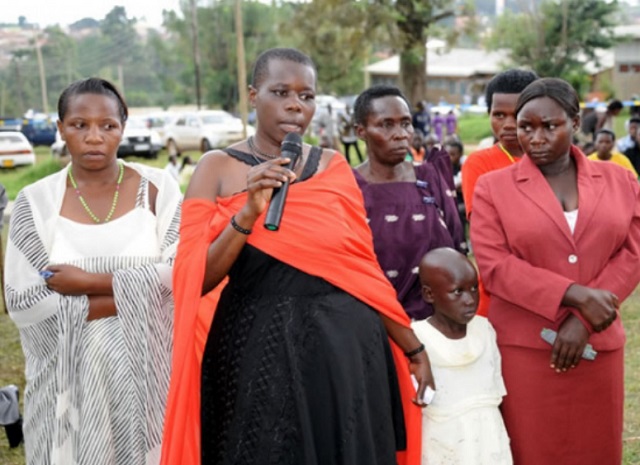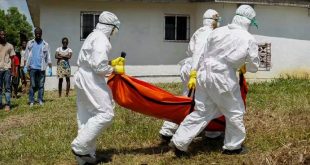
Three survivors in Kibaale District tell their tale
Kampala, Uganda | THE INDEPENDENT | “I will continue to love and serve…”
Few people, if any, would bravely continue to work in situations that nearly ended their lives. This is more so if the cause of that near death is the dreaded Ebola Hemorrhagic fever!
But, Gloria Tumwijuke, a Midwife who contracted Ebola in the course of her duty and miraculously survived, has decided to continue with her work albeit with more caution.
“I will continue to love and serve”, she vowed as she was introduced as one of the survivors of Ebola that broke out in 2012 in Kibaale district, South Western Uganda.
In a somber mood, with tear flowing freely, Gloria narrated how she unknowingly contracted Ebola while helping a mother in labour. “I came in contact with her blood which is common in my work, but after one week, I fell sick with symptoms of Ebola”, she narrated.
Her condition deteriorated and she was eventually transferred to Mulago National Referral Hospital in Kampala for advanced care. Luckily, the country’s disease surveillance system had picked up leads of hemorrhagic fever outbreak in Kibaale. Gloria was thus handled with extreme care in transportation and on arrival at Mulago.
The Uganda Virus Research Institute in Entebbe was quick in testing Gloria’s blood sample. Within hours UVRI positively confirmed the dreaded Ebola virus as the cause of her illness. This is one more example of a dedicated Midwife that indeed got the infection in the line of duty.
Doctors concur that there is no cure or vaccines for Ebola at the moment. Patients are only given supportive care and treatment according to most evident signs and symptoms. That is exactly what Gloria received at Mulago as she embarked on slow, painful recovery process.
Miraculously, Gloria recovered but not her colleague Clare Muhumuza a Clinical Officer at Kagaadi hospital who was also infected while on duty and unfortunately succumbed to the disease. By October 04, 2012 when the World Health Organisation (WHO) and the Ministry of Health declared the outbreak over, the disease had claimed the lives of 17 people most of them from one family.
“I thank God to be alive, I am just lucky, but I am suffering from the after effects of the disease,” Gloria reported adding that “I forget a lot and I have lost all my hair as you can see. But doctors tell me I am okay and I will overcome these problems with time”.
“I am my mother’s husband now…”
But for Alice Ngonzi Isoke (30), another Ebola survivor, the situation is rather different – even tragic. Alice is the embodiment of a typical Ugandan rural woman – visibly hurting, yet amiable and welcoming; evidently suffering, yet sure to prevail; seemly overwhelmed but determined to challenge her current predicament!
Alice is from the family with the probable index case and most of the Ebola deaths from this outbreak occurred in her family. “We really suffered; most of my brothers, their wives and my father died. On one day we buried three people and almost all of us at home were sick,” she narrated.
Because most of the boys in Alice’s family died, she is now the heir to her father and head of the family. This is an unusual occurrence in this highly male-dominated society. With obvious determination Alice assures us that now she is in-charge of her family.
“I am now my mother’s husband, my sister’s father and my child’s grandfather,” she announces amid laughter and looking at her mother who is also an Ebola survivor. She has no doubt about the daunting task that lies ahead, that is, looking after her ageing mother, educating her siblings and building them a decent house that her late father had started.
That is the ambition, but actually realising it is a fundamental challenge to which Alice has no immediate answer. While getting work to earn a decent income is an uphill task in this community, Alice’s dilemma is compounded by the stigma she and her family have to endure in the village. They are shunned and avoided by everyone to the extent that her hair salon from which she used to earn some money is on verge of collapse due to lack of customers. “Ever since I left the hospital, nobody comes here anymore; people don’t even come to our home. They think we still have Ebola” she says with suppressed laughter. If only her salon would work as before, Alice is sure to fully face the challenges of life her father bequeathed her.
It is a difficult situation that Alice and her family have to endure but as we silently empathize with her, Alice rescues the situation by making fun of our miserable faces! She is indeed given to the jocular and can pull off a joke even in somber situations.
As Alice takes us to another relative some 25Kms away, she says none of us is more famous than her and she goes ahead to prove it. “I was on television in America! Have you ever been on TV in America?” We were all blank! Apparently, several local and international television crews that visited her home during the Ebola outbreak and after her discharge from hospital gave her license to appear on TV in America.
Chased and abandoned by dad
Later, we meet Diana Alinaitwe (18) Alice’s sister-in-law. She was married to Alice’s young brother who died of Ebola. As the disease claimed lives in Alice’s family where Diana also lived, she decided to return to her father’s home in Manyinja Village, Kyebando Sub County.
As any child would expect, Diana took for granted the love, empathy, rehabilitation and care she would get from her parents. She was mistaken! The fear and stigma for Ebola is so deeply rooted in this community to the extent that Diana was not only rejected by her parents, but also chased away! No amount of explaining and counseling would convince them to accept their own daughter.
After a two-hours hunt we found Diana fending for herself in an abandoned house on the outskirts of the village – in fact in the bush. In this ghostly place, Diana sleeps on the floor with her only valuable possession being a cloth locally called “lesu” which she also uses as a blanket!
Because Diana was not admitted to Kagaadi Hospital as a suspected case, she did not benefit from the WHO-supported discharge package that every person leaving the Isolation Ward was given. She would have had at least more than what we found!
Her situation is the epitome of suffering. For the first time, Alice, her wit and resilience notwithstanding, broke down and cried. She wondered amid sobs why it was only her family suffering to this extent due to Ebola. None of us had an answer!
After talking to and counseling Diana, we gave her a few shillings we could collect amongst ourselves and headed for Kagaadi Town where WHO and the Ministry of Health were set to declare the end of Ebola outbreak 42 days after discharge of the last Ebola confirmed case.
Preparations for the function were in high gear. There was a celebratory mood all over the place. The remaining task was to convince Gloria, Alice, Diana and other Ebola survivors to attend the function which they gladly accepted.
During the function the WHO Representative, Dr. Joaquim Saweka, invited all the seven Ebola survivors present to join him during his speech. He shook hands and interacted with each one of them explaining to the public that his strong gesture was meant to show that the survivors were no longer dangerous and infectious Ebola patients.
Indeed, the occasion was an opportunity not only to celebrate the end of Ebola, but also to assure the general public that the survivors had fully recovered and should be respected and considered as normal as anyone.
****
Source: WHO Country Office
 The Independent Uganda: You get the Truth we Pay the Price
The Independent Uganda: You get the Truth we Pay the Price


